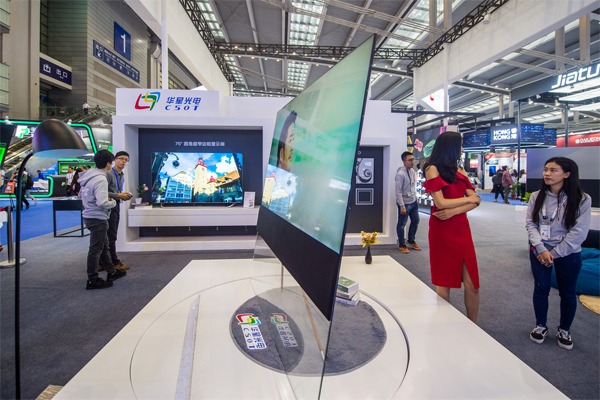Aid with a heart lifts industry's soul

A TCL CSOT product on display during a high-tech exhibition in Shenzhen, Guangdong province. [Photo by Liu Yi//For China Daily]
Pandemic-related tax cuts, subsidies, fee exemptions, bonds to pre-empt frauds and bailouts
While large economies such as the United States, Japan, the United Kingdom and the European Union continue to reel from the impact of the COVID-19 pandemic, China's economy grew by 3.2 percent year-on-year in the second quarter, making experts and laymen wonder alike: How on earth was such an achievement possible?
Analysts said the better-than-expected growth in spite of the pandemic can be attributed to the Chinese government's sharp and sustained focus on keeping the wheels of the world's second-largest economy turning, through prudent, textbook-compliant yet imaginative fiscal policies.
Nowhere is the positive impact of such policies more evident than in Shenzhen, the poster city of New China in the southern Guangdong province.
Even at the peak of the outbreak, key factories in the city that serve not just the domestic market but the world remained open because shutting them could have proved costlier.
For instance, a sight like that of a worker in a protective suit operating a four-story-high robot arm to move a 75-inch liquid crystal display panel to the next process on the assembly line was not uncommon at the height of the outbreak.
In fact, at the factory of TCL China Star Optoelectronics Technology Co Ltd (CSOT) in Shenzhen, a wholly-owned subsidiary of home appliances giant TCL, such scenes were considered normal. The company knew the cost of halting some production equipment would be huge. TCL alone supplies as many as 17 percent of panels for the world's television producers. It boasts the world's second-largest market share in TV panels.
Located in Guangming district, about a 70-minute drive from downtown Shenzhen, TCL CSOT's TV panel factory is one of the many that dot the more than 200 industrial parks. Here, a large group of high-tech, new energy and new material companies are thriving on the back of supportive fiscal policies launched by the central, provincial and local governments in the wake of the pandemic.
"Our current level of supply can't meet the sharply higher demand of TV-makers, our clients," said Yang Anming, senior vice-president of TCL CSOT.
Yang expects the subsidiary's sales revenue to increase by 26 percent this year to 42.8 billion yuan ($6.18 billion).
When the COVID-19 shutdown ended and near full-scale production resumed in late April, the company accelerated its output. That was possible thanks to the Shenzhen city government's concessional tax policies.
The company was allowed to pay value-added tax on imported equipment in installments. It also enjoyed VAT rebate. All this saved about 200 million yuan in costs.
Besides, the tax authorities reduced a part of tariffs on imported materials, components and purification room system. This saved another 200 million yuan for TCL CSOT, according to Yang.
"The preferential tax policies helped ease our financial crunch, enabling us to focus on increasing production, which in turn empowered us to build factories overseas," said Yang.



 Print
Print Mail
Mail

